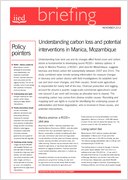Rainforest in Transition: Is the Amazon Transforming before Our Eyes?The Amazon rainforest is in flux, thanks to agricultural expansion and climate change.
|
Carbon Source or Carbon Sink: Greenhouse Gases in the TropicsThe lush vegetation wrapping the center of the globe is one of the most important features for regulating a stable climate in the world. Much excess CO2 emissions from industrialized regions find their way to the equator to be absorbed by abundant CO2-consuming plant life.
|
Better Forest Data Lends Confidence to Carbon MarketsA study published in Nature Climate Change this week measured both the biomass of different types of tropical forests and the emissions lost via deforestation, providing more accurate data than was previously
|
World Bank’s New Greenhouse Gas Accounting Methodology Approved by SCS Scientific Certification Systems (SCS) has assessed the World Bank’s new methodology for estimating the emission reductions resulting from adoption of sustainable agricultural practices.
|
World Bank’s BioCarbon Fund launch a report on AR CDM experienceThe World Bank yesterday launched a new report by the BioCarbon Fund entitled “The BioCarbon Fund Experience: Insights from Afforestation / Reforestation Clean Development Mechanism Projects”.
|
UN support for soil carbonTHE United Nations has thrown its support behind soil carbon, but Australian attempts to create a market mechanism to reward the building of soil carbon reserves are still mired in complexity.
|
World Bank Reports Experience with A/R Biocarbon Fund Projects
|
New research can save tropical forestsScientists from the University of Gothenburg, Sweden, have investigated how much carbon the natural forests of Sri Lanka contain.
|
Africa and the CDM: a dead-endGiven the dismal state of carbon markets currently, it is baffling that there is a push to expand them to the African continent; yesterday the Africa Carbon Forum opened in Addis Ababa and next week there is a two d
|
Melbourne eyes Tassie forest investmentCity Council could invest in Tasmanian forest plantations protected from harvesting in an effort to become Victoria's first carbon-neutral council.
|
When, where and how wood is used impact carbon emissions from logging
A new study from the University of California, Davis, provides a deeper understanding of the complex global impacts of deforestation on greenhouse gas emissions.
|
Trees Absorb Less Carbon in Warming World Than Experts Have AssumedTrees may not be the planetary saviors people have been counting on in a warming climate.
|
Deforestation Emissions May Be a Third of Prior EstimatesThe carbon emissions from cutting down tropical forests may be about one third of the level previously estimated, according to an article in the journal Science
|
As the Earth warms, forest floors add greenhouse gases to the airHuge amounts of carbon trapped in the soils of U.S.
|
Mangrove conservation is 'economic' CO2 fixProtecting mangroves to lock carbon away in trees may be an economic way to curb climate change, research suggests.
Carbon credit schemes already exist for rainforests; the new work suggests mangroves could be included too.
|
Brazil Perfects Monitoring of Amazon Carbon EmissionsA new system to calculate the amount of greenhouse gases generated by deforestation in Brazil’s Amazon jungle region has come at a good time for assessing the effects of the reform of the country’s forest code.
The new satellite system optimises government monitoring of forests.
|
Origin drops forestry deal amid carbon worries
Origin Energy has quit $133 million worth of options for forestry projects in Australia amid fears that the price of carbon will plunge, according to The Australian Financial Review.
|
Brazil's Boa Vista Forest Carbon Offset Project Earns Verification from SCSSCS Global Services has verified the Brazilian Boa Vista Afforestation/Reforestation carbon offset project under the American Carbon Registry (ACR) Standard. The project sequesters greenhouse gases (GHG) by planting and managing fast-growing Acacia mangium Willd.
|
New Way to Capture Carbon: More Forests
|
Counting carbon: Measuring carbon stocks in logging concessions in Cameroon Deep inside a logging concession in southern Cameroon, scientists from the Centre for International Forestry Research (CIFOR) are measuring the carbon content of a huge tree, selectively felled by a timber company.
|
Noble Provides Project 81 Carbon SequestrationNoble Mineral Exploration Inc. (the "Company" or "Noble") is pleased to provide an update, further to its press releases of August 22, 2012 and September 10, 2012, on the carbon sequestration modelling undertak
|
Understanding carbon loss and potential interventions in Manica Understanding how land use and its changes affect forest cover and carbon stocks is fundamental to developing Understanding how land use and its changes affect forest cover and carbon stocks is fundamental to developing
|
Do carbon offsets work? The role of forest management in greenhouse gas mitigationAuthor: Fried, Jeremy
Date: 2013
Source: Science Findings 155. Portland, OR: U.S. Department of Agriculture, Forest Service, Pacific Northwest Research Station. 5 p.
Station ID: SF-PNW-155
|
Plants Help Control Carbon Sink, Keep The Earth From CookingAccording to a new study led by Princeton University, enhanced growth of the Earth’s plants during the 20th century has caused a significant slowdown of the Earth’s transition to being “red-hot.” This study, the first to specify the extent to which plants have prevented
|
Woodland schemes cutting down corporate emissionsSince the launch of the Woodland Carbon Code in 2011, UK businesses have become more aware of the benefits of emissions sequestration through the investment of sustainably managed woodlands.
|
|
|